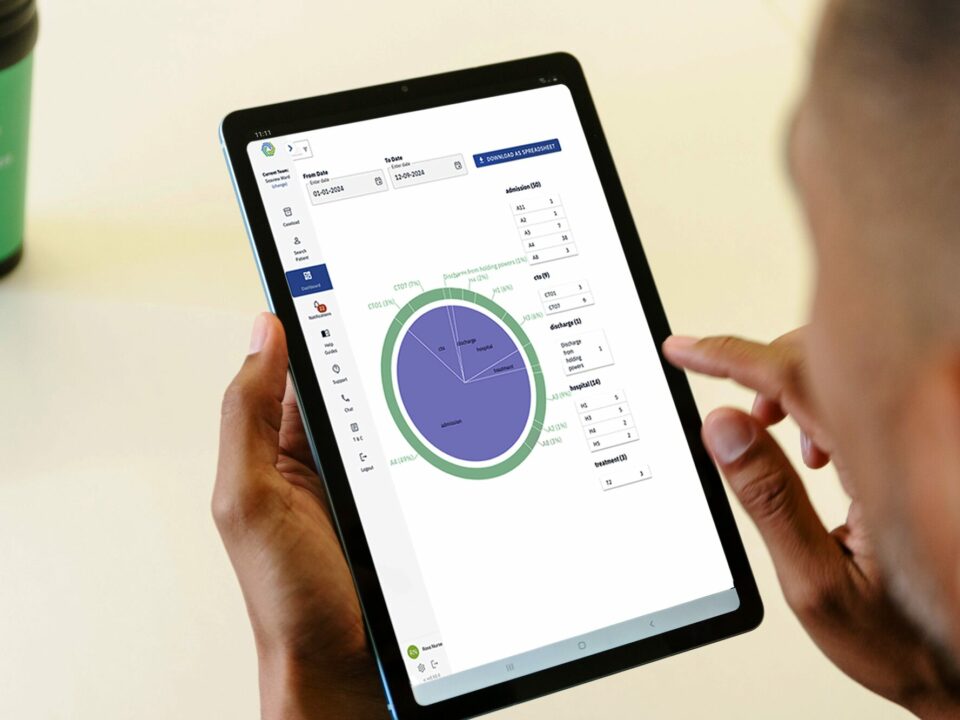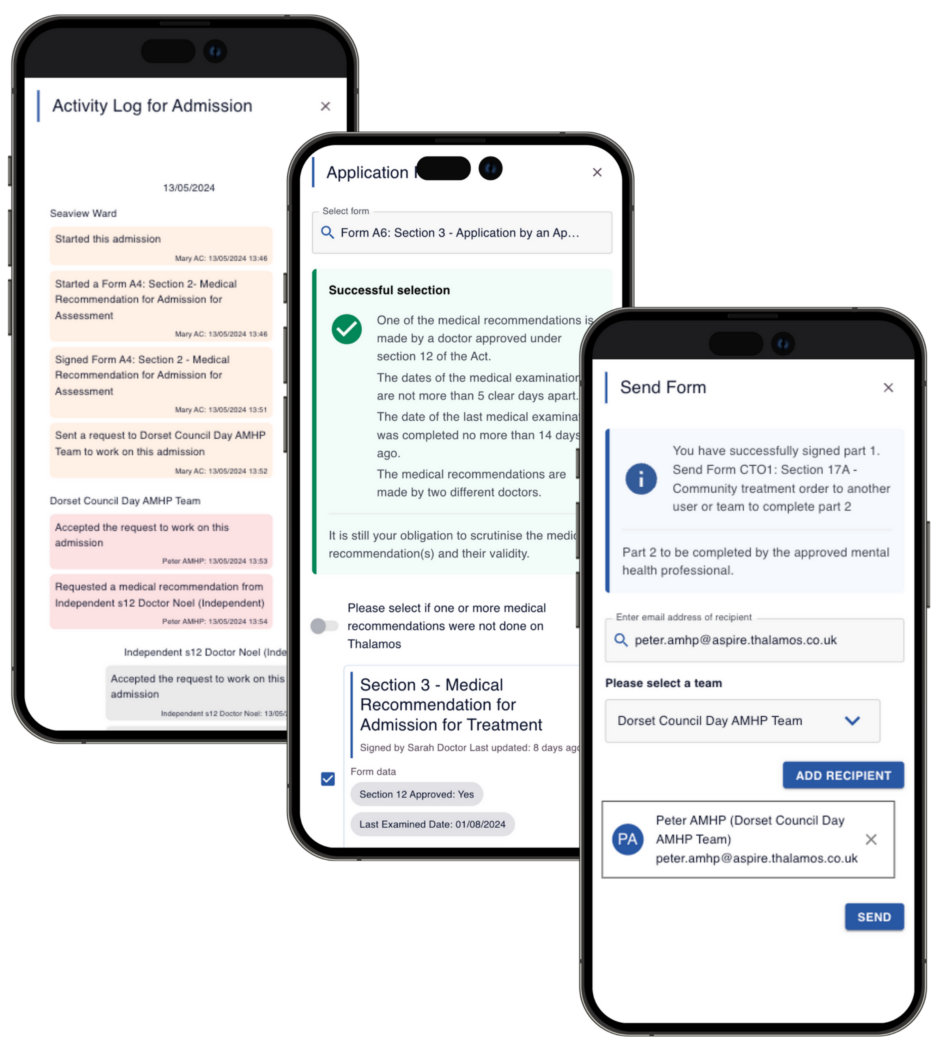Benefits of eMHA by Thalamos
At Thalamos, we believe in a transparent, evidence-based approach to measuring impact. Every benefits calculation we produce is grounded in real-world clinical activity, national benchmarks, and usage data from our customers.
This is also based on our absolute commitment to help make data-driven actionable insights that benefit patient care, support clinicians to make timely decisions, thereby safely reducing overall costs.
Our flagship product, eMHA by Thalamos, digitises statutory Mental Health Act (MHA) processes. This unlocks faster care, better communication, and significantly reduces the risk and administrative burden associated with paper-based workflows. By streamlining essential processes, we enable professionals to perform at their best and focus on what truly matters — patient care.

Ready to calculate your benefits?
This page breaks down, in detail, how we calculate the benefits of using eMHA by Thalamos. However, if you’re ready to see how these benefits could apply in your service right now then use our easy-to-use calculator. By adding a few key details, you’ll get a clear, evidence-based view of the savings and improvements eMHA by Thalamos can deliver.
The calculator also gives you a ready-made framework for your business case, showing potential financial, clinical and operational gains. Download it today to explore what digitising Mental Health Act processes could mean for your organisation.

How we generate your personalised benefits calculation
We don’t just offer a flat rate or guess at potential savings. We provide a bespoke return-on-investment (ROI) model built from your service data and national metrics.
We use:
- Population served
- Number of annual MHA admissions
- Number of repeat detentions (within 6 months)
- Average inpatient length of stay
- Number of unlawful detentions (if known)
- Staff roles and time involved in scrutiny and form processing
If this data isn’t readily available, we apply national averages from NHS sources, academic research and insights from existing Thalamos customers
Using studies and customer implementation feedback, we apply realistic assumptions to project:
- Reduction in form errors (typically >90%)
- Reduction in repeat detentions where Advance Choice Documents (ACDs) are used
- Number of paper forms replaced and associated CO₂ savings
- Reduction in repeat detentions where Advance Choice Documents (ACDs) are used
- Number of paper forms replaced and associated CO₂ savings
To quantify the benefits, we use:
- NHS Band averages for staff hourly rates
- Per day bed costs for internal and out-of-area placements
- Legal cost benchmarks from NHS Resolution data
- Carbon data from NHS paper and print emissions metrics
By combining all the above, we calculate a robust estimate of:
- Annual cashable savings
- Time released to staff
- Clinical and legal risk reduction
- Return on investment — usually 6x or more
This process gives you confidence in the value of digitisation and supports a strong business case for clinical, operational, and financial stakeholders alike.
Calculating impacts and benefits
Error reduction
Error reduction
What’s the benefit?
As the forms are completed by hand/typing without validation, they regularly contain errors in basic fields including patient demographics and other administrative details. This then leads to additional time needed to go back and correct forms within the tightly defined legislative timeframe which means administrators must chase clinicians to ensure they are operating within the law.
Example impact:
- Admin time saved per error is 30 minutes each for administrative and clinical roles
- Assuming an average error rate of 46% (figures from live field study) and a product-enabled reduction of 90%
- And average clinical wage of £40.25/hour and administrative wage of £17.27/hour
- This generates annual cost savings of £11,907
Clinical time saved
Clinical time saved
What’s the benefit?
When clinicians take part in detaining a patient, they must complete several physical forms by hand, pulling key information accurately from other locations. Being able to complete this via an online platform which auto-populates administrative fields saves time and allows them to focus on the clinical details and higher value time with patients.
Example impact:
- At assumed average, based on official 2025 statistics, of £40.25 per hour for a clinician’s wage
- And an average time saving of 25 minutes per admission
- 1,000 yearly admissions would result in time savings of 417 hours
- This would create annual savings of £16,771 per year
Admin time saved
Admin time saved
What’s the benefit?
Mental Health Law administrators must receive the forms, scrutinise them for accuracy and file them. Digital submissions reduce the number of fields that need checking and eliminate manual searching and filing. This frees up time for higher value tasks.
Example impact:
- At assumed average, based on official 2025 statistics, of £17.27 per hour for a administrator’s wage
- And an average time saving of 42 minutes per form
- 1,000 yearly admissions would result in time savings of 3,500 hours (5 forms per admission)
- This would create annual savings of £60,445 per year
Unlawful detention reduction
Unlawful detention reduction
What’s the benefit?
Detentions can be unlawful for a range of reasons, as the law is complex and requires careful checking. A digital system which codes in the legal checks reduces the risk of unlawful detentions, reducing stress on staff and reducing risks to patients.
Example impact:
- At assumed average, based on NHS resolution data, of £41,894 per unlawful detention
- A reduction from 5 to 0 unlawful detentions would generate £209,470 in potential avoided legal costs
Incident reduction
Incident reduction
What’s the benefit?
Real-time information flow helps prevent breakdowns in care and reduces reportable incidents.
Example impact:
- 31 fewer clinical incidents recorded annually
Improved patient flow
Improved patient flow
What’s the benefit?
Incremental delays in receiving and processing different aspects of the statutory forms required to admit, treat and discharge patients leads to an increased length of stay. Digitised processes, which increase speed and visibility of key actions, alerts and next-step tracking allows for faster decisions, treatment and coordination of discharge resulting in reduced length of stay. Cost savings are based on ensuring a proportion of the length of some patient stays can be attributed to delays caused by paperwork which can impact on their time to recovery or the time to safe discharge which is averaged out across entire patient cohort. This delays to recovery or discharge include: the impact on recovery of delayed admission or transfers between sites due to lost or inaccurate paperwork; delays or interruptions to starting or continuing certain treatments due to paperwork and consents not being in place; delays to tribunal or hospital manager hearings due to incomplete or missing reports or paperwork; and delays to discharge paperwork completion or recording.
Example impact:
- With product-enabled reductions of 1 day per patient stay
- And an average Mental Health Trust bed day cost of £629
- 1,000 admissions a year would result in 1,000 bed days saved
- And a saving of £629,000 per year
Reduced repeat detentions via ACDs
Reduced repeat detentions via ACDs
What’s the benefit?
Digital Advance Choice Documents support more personalised, joined-up crisis care. They can help reduce readmissions under the Mental Health Act by strengthening early intervention and making crisis responses more effective. They allow people to record treatment preferences while well, helping clinicians act quickly and in line with proven strategies. By reducing conflict, building trust, and ensuring care aligns with what works for the individual, ACDs encourage ongoing engagement with services and reduce the likelihood of readmission. Because they can be shared across agencies, they improve continuity of care and support safer discharges, lowering the likelihood that someone will need to be detained again under the Act.
Example impact:
- 17 fewer repeat detentions
- 1,167 bed days saved
- £676,898.62 in cost avoidance
Environmental impact
Environmental impact
What’s the benefit?
Digitisation eliminates thousands of paper forms annually — supporting net zero goals.
Example impact:
- 124,500 sheets of paper saved
- 62 kg of CO₂e emissions avoided per year
Empowering professionals, enhancing care
At Thalamos, we believe that meaningful transformation in mental health care often starts not with radical overhauls, but by doing the basics brilliantly. Too often, “transformation” is equated with complexity — when, in reality, the biggest strides come from refining core processes so they work reliably, efficiently and in service of better outcomes.
That’s exactly what eMHA by Thalamos is designed to support. By streamlining statutory Mental Health Act (MHA) processes, we enable professionals to reduce avoidable error, eliminate duplication, and access the right information at the right time. This ultimately freeing them to focus on delivering safe, compassionate care.
This focus on getting the basics right doesn’t just improve individual performance; it strengthens the overall system. When frontline staff are empowered by digital tools that make the job easier, not harder, the whole care pathway becomes more effective. It’s a foundation for consistent, high-quality mental health care.
Building a transparent, collaborative future
Our commitment to transparency and evidence-based practice is unwavering. We understand that each organisation has unique challenges and goals. That’s why we offer to collaborate closely with you, using your live system data to co-create a robust cost and benefits realisation model. This partnership ensures that the projected outcomes are not only realistic but also tailored to your specific context.
By working together, we can develop a comprehensive understanding of the potential impacts of digitising MHA processes within your organisation. This collaborative approach not only builds a stronger business case but also fosters trust and shared ownership of the transformation journey.
We invite you to engage with us in this process, confident that our shared commitment to openness and precision will lead to meaningful improvements in mental health care delivery.
See how these benefits could apply in your service with our easy-to-use calculator. By adding a few key details, you’ll get a clear, evidence-based view of the savings and improvements eMHA by Thalamos can deliver.
The calculator also gives you a ready-made framework for your business case, showing potential financial, clinical and operational gains. Download it today to explore what digitising Mental Health Act processes could mean for your organisation.


